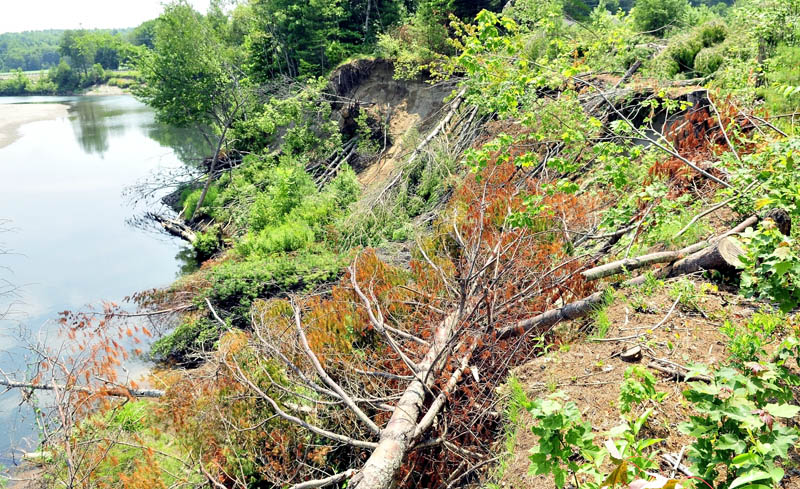FARMINGTON — Local officials are predicting the imminent collapse of Whittier Road after federal officials decided not to declare a rapidly eroding riverbank on the Sandy River an emergency.
Had the situation been declared an emergency by the Federal Emergency Management Agency, a $277,170 bank stabilization project would have bypassed some federal regulations and allowed for others to be completed after the repair work.
Now work can’t start until the project has been fully vetted by multiple federal agencies. The first step of the review requires the town to submit a biological assessment that will help to determine the effect on salmon in the Sandy River.
“It’s going to take six to 12 weeks to complete this assessment,” Town Manager Richard Davis said. “We won’t be able to do any construction this construction season. That puts us to next year at the least. In all likelihood, the road will have failed by then.”
Davis learned of the decision during a conference call organized by U.S. Rep. Mike Michaud, D-2nd District, when the town, the federal agency, the Maine Emergency Management Agency, the U.S. Fish and Wildlife Service, and representatives from the offices of U.S. Sens. Susan Collins and Olympia Snowe discussed the issue.
The town recently asked the legislators to get involved in an effort to hasten the process.
A 50-foot-wide, 300-foot-long section of the riverbank collapsed into the water near the Pillsbury Sand Bar during Tropical Storm Irene last August. Ever since then, the riverbank has been eroding. More than 9 feet have fallen away in the last few months, leaving the bank within 30 feet of the roadway, some of which is overhang.
“We’re steadily losing ground,” Davis said, “literally.”
A recent spell of dry weather caused further erosion, Davis said, by allowing the sandy soil on the face of the embankment to dry out and blow away.
The federal agency doesn’t recognize it as an emergency because human safety is not endangered, said Laury Zicari, field supervisor for the U.S. Fish and Wildlife Service, who participated in the call. Both federal agencies have expressed concern that the project could threaten critical habitat for the endangered Atlantic salmon.
“FEMA’s official call is that right now, this doesn’t seem to be an imminent loss of life or property,” Zicari said. “That doesn’t make the town happy. They think that they might lose the road within the next six months or sooner.”
Davis said that the situation does threaten lives, however, because it will be difficult to know when to close the road down.
“They’re saying that it’s not an emergency because it doesn’t pose an immediate threat,” Davis said. “I’m not sure why. I guess they’re assuming that we would have some advance notice if it fails.”
An average of 2,420 vehicles travel on the road every day, according to data from 2008 compiled by the Maine Department of Transportation.
The town’s next step is to complete the biological assessment, which will then be included in an application to the federal agency that seeks funding for the project. Davis said that the assessment will cost both time and money.
“It’s obviously expertise that we don’t have at the town level,” Davis said.
The assessment will involve the hiring of a consultant who can help to determine how, if at all, the project will affect salmon in the Sandy River.
Davis said the federal agency would assist with the assessment, but that he was unsure to what extent.
Zicari said that during the conference call, the federal emergency agency pledged to process the application in a timely manner and put several staff members on the project to work with Farmington.
The problem is additionally complicated because work can be done on the river only when the salmon are not spawning, a period which begins at the end of September. Even if the project is approved in six weeks, if it can’t be completed by Sept. 30, it will be delayed until July next year, Zicari said.
Davis said that he thought the project, once begun, would take only a couple of weeks to complete.
Davis expressed frustration, and said that he sees no alternative but to comply with the federal regulations.
“I’ve never run into a situation quite like this, that we feel is an emergency and the federal reviewing agencies don’t feel it’s an emergency,” Davis said. “We’re just trying to be proactive to mitigate the threat.”
Send questions/comments to the editors.




Success. Please wait for the page to reload. If the page does not reload within 5 seconds, please refresh the page.
Enter your email and password to access comments.
Hi, to comment on stories you must . This profile is in addition to your subscription and website login.
Already have a commenting profile? .
Invalid username/password.
Please check your email to confirm and complete your registration.
Only subscribers are eligible to post comments. Please subscribe or login first for digital access. Here’s why.
Use the form below to reset your password. When you've submitted your account email, we will send an email with a reset code.